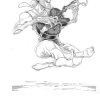Home » Jazz Musicians » Chords
Chords
Backgrounder: Milt Bucker's 'Block Chords Parade'

Source:
JazzWax by Marc Myers
What are block chords? That's when a pianist (or guitarist) plays a melody with chords rather than individual notes. This is done with the top note of the chord playing the melody line with chord notes below creating the harmony. Block chords are often played on piano with a “locked hands" technique, when both hands play block chords in unison or lock-step. To illustrate, let's visit with the great Dick Hyman... As Dick notes, Milt Buckner pioneered the block-chords sound, ...
read more
Announcing Modalogy - Scales, Modes & Chords: The Primordial Building Blocks of Music

Source:
John Kelman
Primarily a music theory reference, Modalogy presents a unique perspective on the origins, interlocking aspects, and usage of the most common scales and modes in occidental music. Anyone wishing to seriously explore the realms of scales, modes, and their real-world functions will find the most important issues dealt with in meticulous detail within these pages. Logical illustrations accompany in-depth examinations of chordal harmonies, cadential motions, and progressions. This book is perfect for both music students and teachers, as either a ...
read more
New Lesson Just Released: Dominant Chordscales
Source:
Bill Rinehart
While the mixolydian mode is the default dominant chordscale, there exists a whole world of dominant chordscale choices, each one possessing a unique sound palette owing to it's singular tension profile. The Monkish whole tone, the tense altered scale and the evocative blues scale are just three of the possibilities explored in this lesson. Learn where the scales come from, how to build them and see how Clifford Brown, Kirk Lightsey and Thelonious Monk have used them in their solos. ...
read more
New Lesson Just Released: Chordscales of Minor ii-V-i Progressions
Source:
Bill Rinehart
The derivation of chordscales for minor ii-V-i progressions is less straightforward than with major ii-V-Is. Each minor key has three scales whereas each major key has just one. In this lesson, watch as the chordscales for minor ii-V-i progressions are derived from their component 13th chords and then see how the resulting chordscales are used by Miles Davis in his improvised solo over the tune It Could Happen to You from his 1956 release, Relaxin' with the Miles Davis Quintet. ...
read more
New on jazzpianoonline.com: Chordscales of Major II-V-I Progressions
Source:
Michael Ricci
Chordscales are an essential component of improvisation and major ii-V-I progressions make up most of the chords to any given standard tune. Together, these two elements constitute the bulk of what jazz improvisation is about. In this lesson, watch as the chordscales for major ii-V-I progressions are derived and then see how they are used by Miles Davis in his improvised solo over the tune It's Only A Paper Moon from his 1951 Prestige release, Dig. JazzPianoOnline.com is an on-demand, ...
read more
Three Chords for Beauty's Sake: The Life of Artie Shaw

Source:
Michael Ricci
Artie Shaw, the swing eras other great clarinetist, knew just about every romantic self-immolator in the history of jazz.
He roomed with both Bix Beiderbecke and Bunny Berigan, he hired Billie Holiday to sing with his band and at least by his own account he turned down Charlie Parkers bid to join his saxophone section. (I said, Bird, you couldn't play in my band, you're too much of an individualist! ) Superficially, Shaw couldn't have been less like these doom-bound ...
read more
New on JazzPianoOnline.com: Improvising over Passing Diminished Chords

Source:
All About Jazz
Improvising Over Passing Diminished Chords
Improvising Passing Diminished Chords There is a lot of uncertainty that surrounds diminished chords. How do they work exactly? What chordscales do they take? How do you improvise over them?
Gain some insight into these questions through an examination of Red Garland's solo over the changes to the standard tune It Could Happen to You from the recording Relaxin' with the Miles Davis Quintet from 1956.
This lesson will show you a couple of his ...
read more
Flight of the Conchords Schedule Spring Tour

Source:
Billboard Magazine
New Zealand duo Flight Of The Conchords will embark on an extensive North American tour this spring, beginning April 6 in Tampa, Fla. Highlights of the itinerary include New York's Radio City Music Hall, Red Rocks outside Denver and the Santa Barbara Bowl in California. The group will also play two-show engagements during single-night stands in Milwaukee, Philadelphia and Berkeley, Calif. The outing is timed to the conclusion of the second season of “Flight of the Conchords" on HBO, as ...
read more
Flight of the Conchords Plugs Back In

Source:
Billboard Magazine
Flight Of The Conchords' eponymous HBO show returns to the airwaves on Jan. 18, and this time around, fans will be able to purchase music from each episode the day after it airs, Billboard can reveal. Shortly after the conclusion of the 10-episode season, an as-yet-untitled album featuring 10 tracks from the show plus five additional songs not part of the download promotion will be available on April 14. The first song, “Angels," goes live Jan. 19 on iTunes. Fans ...
read more
New on JazzPianoOnline.com: Chordscale Theory-Modes of the Major Scale

Source:
All About Jazz
Chordscale Theory-Modes of the Major Scale
Dorian, mixolydian, ionian, locrian. You've no doubt heard these terms tossed around in improv books and by teachers but what do they mean and what are they used for? Find out answers to these questions and more in this second lesson in the Chordscale Theory series where the tune Mack the Knife is analyzed and a transcription of Jessica Williams improvising over the changes from her 1997 recording Higher Standards is examined for her ...
read more









